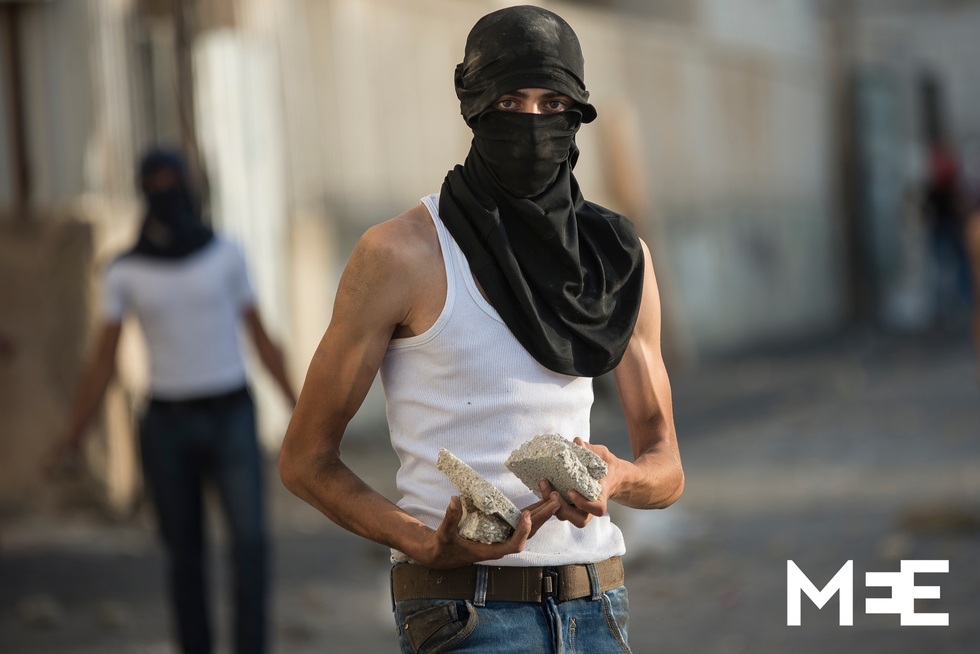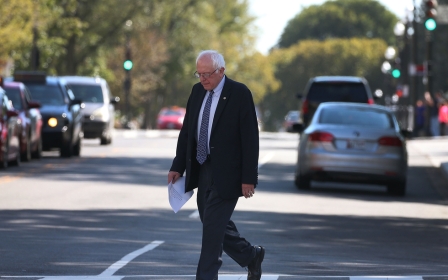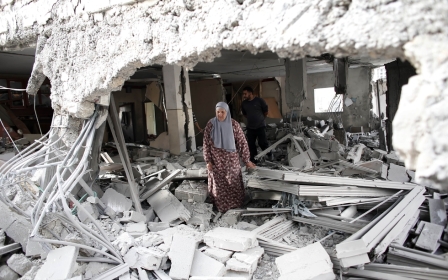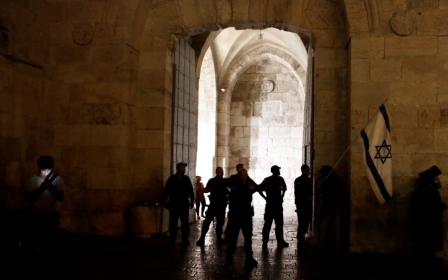As violence spreads, young Palestinians ready for a fight

BETHLEHEM, Occupied West Bank - As the imam’s prayers blared through mosque speakers at Tuesday’s funeral for Abdel Rahman Obeidallah - the 13-year-old Palestinian from a Bethlehem refugee camp who was shot in the chest by Israeli forces the day before - masses of young, mostly male residents from here and other Palestinian cities were sombre, yet fervid to proceed to the post-funeral demonstration against Israel.
The past 11 days of escalating violence have resulted in the deaths of four Israelis and three Palestinians, the most recent of which occurred on Wednesday morning when a Palestinian woman from East Jerusalem stabbed an Israeli man in the Old City of Jerusalem, and again on Wednesday afternoon when two Israelis were stabbed in Kiryat Gat. The Palestinian assailants were both shot at the scene.
But when a group of young protestors were asked if a “third intifada," or uprising, was underway, 14-year-old Bethlehem resident Yusef, who requested to go only by his first name given the sensitivity of the situation, said that it “had already begun, some time ago”.
His friends interjected that a growing call to action crystallised substantially this past July, when suspected Israeli settlers firebombed two homes in the West Bank village of Duma, immediately burning to death Ali Dawabsheh, an 18-month-old toddler. A week later, the boy’s father, Saad, who sustained severe burn wounds, died. In early August, his mother, Reham, who had reportedly been on life support for several weeks, also died.
A young man, hoisting a flag and covering his face with a black and white checkered keffiyeh, explained: “We’re just young kids, but [carrying out this intifada] is what we know and how we were raised ... It's something we have to do given the recent rising number of child martyrs.”
The group of teenagers agreed that while they respect Palestinian leaders and hope that they will finally succeed in creating unity between the various parties, in general, they cared more about the "immediate threats of occupation" than political speeches.
Youths ready to fight
Clashes across the West Bank and East Jerusalem on Tuesday came after the Israeli military demolished two homes belonging to the families of alleged Palestinian attackers - one who killed five Israelis at a Jerusalem synagogue last year, and the other who bulldozed an Israeli man to death in August. Both Palestinians were shot and killed during the attacks.
Israeli troops also sealed off a room in a home of another Palestinian who tried to kill prominent Orthodox Jewish activist Yehuda Glick last year, the Associated Press reported.
The practice, by which the security forces closes the space in preparation for a possible demolition at a later time, has been used by Israeli authorities for years in an attempt to deter Palestinians from committing attacks.
The demolitions were the latest example of what Israeli Prime Minister Benjamin Netanyahu said on Tuesday morning would be a policy of an increasingly aggressive response to "any rioter, inciter or terrorist anywhere," and added that he would loosen restrictions on Israeli security forces.
Demonstrations in Ramallah, Hebron, Bethlehem and East Jerusalem that followed the demolitions resulted in 90 injuries, according to the Palestinian Red Crescent.
And while hundreds of youth continued to use social media to call upon their peers to burn tyres and throw rocks at Israeli soldiers in the West Bank and in Israeli streets, Palestinian President Mahmoud Abbas called on Tuesday for Palestinians to prevent a security or military escalation.
"All our instructions to our (security) agencies, our factions and our youth have been that we do not want escalation,” said Abbas in a meeting with the PLO executive committee on Tuesday in the first statement on the situation since the beginning of the tensions.
“Unfortunately there is this disconnect between the politicians and the youth,” Ghassan Khattib, a former Palestinian Authority cabinet minister, told Middle East Eye. Khattib explained that Abbas and the Palestinian political elite have failed to address the calls for confrontations with Israel.
Khattib, though, differs from other Palestinian analysts in identifying the groups of young men who say they are ready to fight as a minority, a claim which he says is backed up by past surveys in which Palestinians said that past intifadas were largely perceived as a disadvantage.
“Most people are not interested in armed struggle, and so some are hesitant with this wave of protests because of the fear that this minority and some of the organised armed groups might take advantage of this mood, and proceed with armed struggle activities.”
By contrast, a study released last month by the Palestinian Center for Public Affairs (PCPSR) found that 42 percent of Palestinians believe that only an armed struggle would lead to Palestinian statehood, and two-thirds want Abbas to step down as president. Moreover, a majority of 57 percent said they would support a return to intifada in the absence of peace negotiations.
Aqsa restrictions trigger fears
While careful not to criticise Abbas or the Palestinian leaders, Isa, a 24-year old Bethlehem resident said that he and his peers are ready for the next intifada, and that they must “liberate Palestine” against increasing Israeli “dangers”.
“The first danger is to Al-Aqsa, they want to take it,” said Isa. “We will defend it, we will respond to the Jews, and it’s possible, and actually any of us hope, that we will become a martyr at this protest or any other protest.”
His statements reflect a growing trend among Palestinians, according to another PCPSR survey. Earlier this year, the survey found, 86 percent of the Palestinian public said that the Al-Aqsa Mosque complex – which Jews call the Temple Mount - was “in great danger,” and 77 percent said they believed that Israel was intent upon destroying it.
Israel’s government has officially announced that it does not intend to change the status quo at the site held holy by both Jews and Muslims in Jerusalem’s Old City.
However, the site has long been a flashpoint for violence between Israelis and Palestinians, particularly those under 40 who are regularly restricted from visiting. In recent weeks, several right-wing Israeli politicians and grassroots pro-settler groups have called for the government to ban Muslims from the site and to allow increased Jewish access.
“For the new generation, there is no chance for peace,” said Isa, who said that he fondly remembered the Second Intifada. “Once it was possible to make peace with Israel, but we now see the many children who have become martyrs, and we realise it is not possible.”
“We want Palestine to the extent that we will die for it, in the same way that those did in the Second Intifada,” said Diaa, a 20-year-old vegetable shop owner from Hebron. “While there may be fear of organised jihad, we, the young people, are on our own here, because we understand that Palestine is the basis of all wars in the entire world, and so we will fight for it.”
Middle East Eye propose une couverture et une analyse indépendantes et incomparables du Moyen-Orient, de l’Afrique du Nord et d’autres régions du monde. Pour en savoir plus sur la reprise de ce contenu et les frais qui s’appliquent, veuillez remplir ce formulaire [en anglais]. Pour en savoir plus sur MEE, cliquez ici [en anglais].




